|
 
IN
THE NEWS | IN
THE GARDEN | CALENDAR
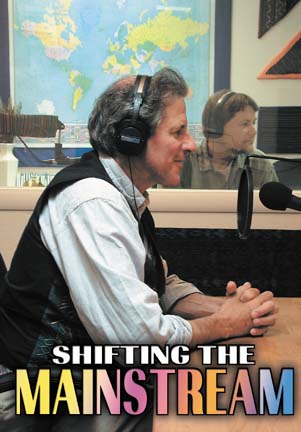
Mainstream
Media Project Executive Director Mark Sommer and Production Engineer
Chuck Rogers.
EVERYWHERE
BUT HERE
THE BACKERS
story and photos by BOB DORAN
FOR MARK SOMMER THE ELECTION
OF 1994 WAS A WAKE-UP CALL.
The so-called "Gingrich
Revolution" dislodged the Democratic majority in the House
and moved America a giant step to the right.
As a progressive, Sommer was
particularly distressed by the role played by conservative and
ultra-conservative talk radio hosts and associated pundits who
relentlessly slammed President Clinton, the Democrats and any
faintly liberal legislation that came along.
"We started the Mainstream
Media Project in 1995 as a direct response to Rush Limbaugh and
the others who had been credited with winning the Gingrich Revolution,"
Sommer recalled recently. "I said to myself, `I don't think
this all has to be dominated by one side.'"
Despite the fact that he was
living without electricity in the hills of Southern Humboldt,
Sommer was already a pundit of sorts. He had been asked to speak
about social issues on a number of radio programs, not an easy
thing to do when you must use a solar-powered radio telephone.
Educated at Cornell University,
Sommer was quickly drawn into activism and the peace movement.
In the 1960s he worked at the Institute for Policy Studies, a
progressive think-tank in Washington, D.C., and later helped
start Liberation News Service, an organization supplying news
and commentary to the alternative press.
By the mid-1990s he had written
three books: Beyond the Bomb, The Conquest of War and
Living in Freedom: The New Prague, and had established
himself as a columnist for the Christian Science Monitor and
for Inter Press Service, a global news service based in
Rome.
Since he was both outspoken
and articulate, talk shows sought him out to offer alternative
perspectives. Even if his role was as a foil for a host who disagreed
with him, his opinions were heard.
"They didn't drive me out.
I was able to talk and have real conversations with people. That
was the basis for putting this project together," he added.
"It wasn't to focus on me. The idea was to give many more
voices a chance to be heard."
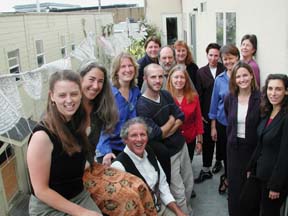
1. Janna Frincke -
Campaign Director
2. Marci Barker - Operations Associate
3. Halimah Collingwood - Media Coordinator
4. Arjuna Twombly - Media Coordinator
5 Chuck Rogers - Producer/Engineer
6. Jimmy Durchslag - Media Coordinator
7. Jill Paydon - Media Coordinator
8. Denice Helwig - Development Director
9. Shirley Santino - Media Coordinator
10. Barbara Browning - Operations Director
11. Bonnie MacGregor - Guests on Call Director
12. Jane Rogers - Station Relations Director
13. Jennifer Hanan - Media Coordinator
14. Mark Sommer - Executive Director
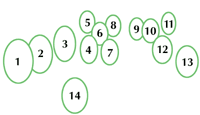
Starting small
Initially Sommer assembled a
small stable of like-minded speakers and hired a publicist out
of New York to help place them on talk shows across the country.
Eventually he would outgrow his backwoods hideaway, move his
family north to Westhaven and set up shop in Arcata.
"When I described the project
to our first funders, the Plowshares Fund, they loved the idea,"
said Sommer, speaking in his Arcata office, a room decorated
with photos of his wife and daughter and, like the rest of the
office suite, with swathes of colorful Guatemalan cloth.
"They said, `What will
you call it?' I said, `How about the Mainstream Media Project?'
They said, `How boring.' I explained, `We're aiming at the mainstream.
We're working in the mainstream media -- trying to bring new
and better-informed voices into the mainstream.'
"There is essentially no
civil discourse to speak of right now in the middle of the mainstream,
at least in this country. Granted there is a lot of stuff happening
at the edges, but because it doesn't filter into the mainstream,
it doesn't reach 95 percent of Americans."
That's where talk radio comes
in. "If you look at the Arbitron figures [surveys on radio
listenership] you see that the audience for talk radio is very
much mainstream America," said Sommer.
Sommer oversees an annual budget
of $750,000 and employs a staff of 17. Headquarters is a suite
of offices tucked away upstairs in the Feurwerker Building just
off the Arcata Plaza.
The Mainstream Media Project's
list of progressive pundits has grown considerably. "We've
put 1,200 people on the air from just about that many organizations,"
said Sommer. The speakers include "policy analysts, big-picture
thinkers and people who are doing practical work on the ground,
not waiting for governments and large institutions to change."
To date the project has booked
and completed more than 10,000 interviews in 50 campaigns. Guests
associated with the media project have appeared on 619 radio
stations and on broadcasts aired by 38 national networks, 26
regional networks and 12 international networks.
"What we do is catalyze
social change," Sommer says. "We're not really a media
organization, we're a social change organization that uses the
media."
Janine Jackson of Fairness and
Accuracy in Reporting, a left-leaning New York City-based media
watchdog group, praised the media project for putting new people
on the air rather than relying on established pundits. "[I]
wish there were more projects like them," Jackson said.
"They inject a new voice into the mainstream."
Roger Aronoff, an analyst with
Accuracy in Media, a conservative Washington D.C.-based outfit,
said when first contacted by the Journal that he was unaware
of the media project. But after researching the project's website,
he said the project appeared to be "a pretty good idea."
It "wouldn't be a bad idea
for a conservative organization" to do something like this,
he said.
EVERYWHERE
BUT HERE
"A WORLD OF POSSIBILITIES"
is broadcast on dozens of noncommercial stations across the United
States. It's available on short-wave radio in 120 countries through
Radio for Peace International out of Costa Rica and on Sirius,
the satellite radio network used in new cars. However,
at this point you would be hard-pressed to find it on the radio
in Humboldt County.
KMUD and KIDE air the program occasionally,
but not on a regular schedule. Until recently KHSU broadcast
the show on Tuesday afternoons following the Home Page show,
but the Arcata-based public radio station has dropped the show.
In part the reason stems from Mainstream Media's decision to
change the program's 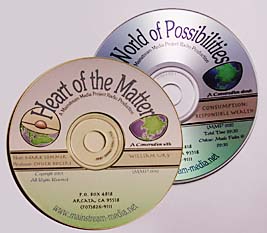 name. name.
When it began airing on KHSU last October
the show was called "Heart of the Matter." Earlier
this year when the time seemed right to roll it out for national
distribution, Sommer figured he'd better make sure the name was
not already trademarked. An Internet search turned up an obscure
radio program with the same name and with links to a national
firearms organization.
"We figured they might take the law
into their own hands so we changed the name. Now we're in the
process of getting the trademark on `A World of Possibilities'
for everything but salad dressing."
Sommer hired a Bay Area law firm to do
an official search. It found hundreds of permutations of "A
World of " this or that. Unfortunately, they overlooked
a little radio program right here in Arcata.
Humboldt State University's Office of Extended
Education produces a weekly five-minute segment for KHSU's Homepage
called "A World of Possibilities." KHSU's station manager
Terry Green decided on principle that the original program has
a right to keep its title.
"We tried to see if there was a practical
alternative to withdrawing the [Mainstream Media] series. Unfortunately
we couldn't," said Green. "`A World of Possibilities'
isn't just Extended Ed.'s radio show, it's across all of their
marketing."
Humboldt County listeners are left with
a few options. You could get a short-wave radio or a new car
equipped with a Sirius receiver. Or you can listen online. All
of the shows are archived on the Mainstream Media Program's website
at www.aworldofpossibilities.com.
|
Setting the
agenda
Central to the project's work
are "campaigns" that focus on a particular issue. A
single-page "alert" is drawn up, laying out the parameters
in a few paragraphs. It is faxed to radio stations along with
a roster of perhaps a dozen speakers who can address different
aspects of the topic.
Sommer says an effort is made
to maintain a degree of neutrality. "We don't want to get
involved in what the left so often does, making a strong ideological
statement of condemnation. Instead we pose a provocative question:
`Is this helping or hurting?' That sort of thing."
The alert usually offers a bulleted
list of facts, "almost like a course syllabus for a free
university of the airwaves, but done in a popularized way, like
headline writing."
For example. The campaign for
this month and next is on civil liberties and the media. The
alert for "Civil Liberties in a Time of National Concern:
Secrecy vs. Privacy" highlights the recently passed USA
Patriot Act, which allows a home to be searched or bugged without
the homeowner's knowledge; the new Department of Homeland Security,
which may be exempt from portions of the Freedom of Information
Act; the FBI's interest in monitoring Internet activity; and
a lawsuit asking Vice President Dick Cheney to release information
on his energy task force.
Sommer sees the alerts not only
as a tool to attract stations to a topic, but also as a source
of information for talk show hosts. A three-person team coordinates
the campaign, calling stations to drum up interest in the topic
and to offer further information about the speakers who can address
it.
"We look for speakers who
are not ideological, that is to say those who do not have an
axe to grind. Above all we're looking for people who really know
what they're talking about, people who are well-grounded,"
said Sommer.
"They may be policy analysts,
those who know the policies currently being pursued and those
that could be pursued. We want people who are solution-oriented,
who aren't just critics. We insist that they also take responsibility
for providing alternatives and talk about them on the air.
A campaign in the spring regarding
the War on Terror posed the question, "Does U.S. foreign
policy reduce or provoke acts of terror?"
Speakers included Carl Conetta
from the Project on Defense Alternatives. "He has been in
the peace movement for a long time," said Sommer. "So
has Craig Eisendrath [from the Center for International Policy],
another speaker. Then we had Larry Korb from the Council on Foreign
Relations, which is about as establishment as you can get. He
was assistant secretary of Defense in the Reagan administration,
but he's a great critic of current American policy.
"What we're finding more
and more in the current political climate is that left and right
are starting to agree on civil liberties issues, sometimes on
security issues and especially on the question of privacy and
secrecy. Things just are not as neatly divided between liberal
and conservative as they used to be."
Sommer mentions Larry Klayman,
who runs an organization called Judicial Watch. A fierce critic
of Clinton, Klayman now has his sights on the Bush administration,
recently suing Vice-President Cheney over his involvement with
the Halliburton oil company. "We're putting [Klayman] on
all over the place. And he's coming to us asking for guests to
put on his show [The Judicial Watch Report]."
In addition to policy analysts,
the project is looking for "big picture thinkers who are
completely reconceptualizing beyond current policies, people
who are thinking about how you change the core paradigm.
"For example," Sommer
goes on, "if we do a campaign on globalization, we would
have some people who could analyze GATT (the General Agreement
on Tariffs and Trade) and the WTO (World Trade Organization)
in detail, but we would also want someone like David Korten who
wrote, When Corporations Ruled the World -- someone who
can project out and say, `This is what an alternative economy
might look like.'"
Sommer also keeps an eye out
for innovators. "If we were dealing with renewable energy
or the Bush energy plan, you don't just want people who can criticize
the current plan, but people who are working on alternatives
-- someone like Peter Lehman at Humboldt State who is working
on a hydrogen fuel-cell car. That's wonderful stuff. It may be
small scale right now, but if you let them tell their story it
becomes an inspiration to others."
On-call speakers
As Mainstream Media has grown
and garnered funding from a number of foundations, it has branched
out in new directions. In addition to the campaigns where topics
change every two months, the organization has developed "Guests
on Call," a roster of speakers who address more immediate
current events.
Assembling the roster has primarily
been the task of Bonnie MacGregor [photo
at right], a veteran social activist
who has worked for the Redwood Community Action Agency, the Area
Agency on Aging and Humboldt Women for Sh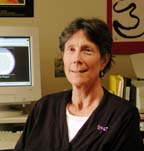 elter. elter.
Heading up a team of researchers,
MacGregor spent over a year "mapping the intellectual territory"
on issues like the environment, the economy and foreign policy,
Sommer said.
"Her team talked to experts
asking who were the best people in every field, people who had
the freshest ideas. Then we recruited those people one-by-one,
talked to them, collected bios and articles written by them or
about them. We created a huge custom data base; it's very complex
and with an elaborate interface."
The Guests on Call digital Rolodex
identifies 1,700 "spokespeople" around the world ready
to address a wide variety of topics. The day she spoke with the
North Coast Journal, MacGregor was finishing up a week
on the effects of toxic chemicals in the environment and planning
for the next issue du jour: socially responsible investment
in the age of corporate scandal.
The approach is similar to that
used with the longer-term "campaigns."
"We frame an issue and
put out some talking points," said MacGregor. "We raise
questions, that's the main thing. We try not to put forward just
one point of view, but we definitely come from our values base."
She finds that dwelling on the
world's problems can be a daunting task. "I spend a good
part of my time looking at the worst issues facing us, and it
can get depressing. But then I go looking for the people who
are doing something about these problems and I get encouraged.
There are wonderful people out there doing incredible things
and what we do helps them find each other."
The potential for making such
connections is about to take a big step forward. Sommer said
that in the next few months the organization will make the database
MacGregor's team has created available to the press and to colleges
and universities.
"Because of the work we're
doing, we're in touch with hundreds, even thousands of organizations
that are doing incredible work. I really feel that if others
know about that work, they will be inspired to do some of their
own.
'A World of
Possibilities'
The third focus of Mainstream
Media is a syndicated half-hour radio program with Sommer or
another host engaging a wide variety of speakers. Originally
called "Heart of the Matter," the name was recently
changed to "A World of Possibilities." The program
is pre-recorded and runs weekly.
Guests have included Richard
Dicker of Human Rights Watch discussing the ramifications of
the Bush administration "unsigning" the treaty that
created the International Criminal Court; Jenny Ladd, heir to
the Standard Oil fortune, and Chuck Collins, great-grandson of
Oscar Mayer, talking of socially responsible philanthropy; and
BBC foreign correspondent Jennifer Glasse offering a report from
Jerusalem on violence and life on the West Bank.
A series on hunger included
former Channel 3 anchor Jane Rogers speaking about malnutrition
in both poor and wealthy nations with Gary Gardner of the Worldwatch
Institute and Anne Sophie Fournier from Action Against Hunger.
Additionally, Ian Vasquez of the Cato Institute and Debra James
of Global Exchange talked with Sommer about free trade and its
effect on food distribution.
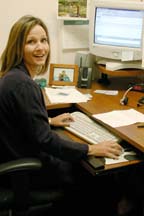 "From
the beginning I thought that the program really needs to have
a national and a global focus," said Sommer, who for the
past 10 years has written for Inter Press in Rome, a world-wide
syndicated column service that goes out to 100 countries in a
number of "From
the beginning I thought that the program really needs to have
a national and a global focus," said Sommer, who for the
past 10 years has written for Inter Press in Rome, a world-wide
syndicated column service that goes out to 100 countries in a
number of 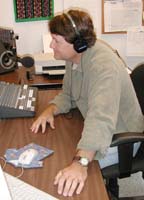 languages. languages.
Chuck Rogers (right)
is producer of 'A World of Possibilities,' a weekly talk show
put out by the Mainstream Media Project. His wife, Jane Rogers
(on the left), was the anchor for KIEM's nightly news program
in the late 1990s. She joined the Mainstream team last December.
"What it's done is to change
the way I think, because I'm writing for an audience that is
not just American. I really believe that the kinds of problems
we're now facing as a country and as a species are going to require
global action and a global conversation in order for them to
be truly addressed.
"Right now what we have
is two non-intersecting conversations going on, one that is within
the American elite, not even the whole American public, just
a very small group of pundits and politicians. Then there is
the conversation that the rest of the world is having, one that
does not include the United States -- and the United States is
not paying attention to it. That's how we get these terrible
disconnects where our policies are just so destructive of any
kind of global consensus.
"The direction we're going
with this program is an attempt to create that global conversation
for civil society, for citizens rather than governments and private
business -- the rest of us essentially."
In Sommer's mind the possibilities
are endless. His vision includes an international talk show with
a satellite uplink so that people around the world can share
ideas. "The miracle is you can do that now from a place
like Arcata, from a little studio like this."
The mainstream
within us
As the interview wound down,
Sommer returned to his decision to use the word "mainstream"
to describe an organization offering alternative perspectives
on the issues of the day.
"I had a breakthrough recently,"
he said, "a realization that there's an inner mainstream
in every human being, a sense that at a fundamental level we
all want the same thing: We want acceptance. We want a sense
that what we're doing in the world has some meaning. We want
to feel that we are part of something larger, something with
a sense of purpose.
"I feel that in this country
and in many other countries, the small elites that try to govern
the rest of us for their own benefit are betraying their own
inner mainstream --are so disconnected from themselves and from
the consequences of their actions that they believe they can
somehow exempt themselves from the carnage they are creating
when they destroy the environment or destroy the cultural environment.
They don't even realize that they are destroying the future,
their children's future.
"I feel that we are bringing
forth the true mainstream and that these people are on the extreme
edge," Sommer went on. "They only pretend to be the
mainstream. The so-called silent majority of this era is a real
majority that wants to do something about poverty, about climate
change, about war. They may not want everything that progressives
want, but they at least want to make sure that we have a stable,
sustainable society for the future.
"I believe in the end that
progressives can't make the future alone, conservatives can't
make it alone, we are going to have to make it together. That
means we're going to have to redefine the mainstream and understand
that that current, that river of humanity, runs through everyone
and connects us all. In that way I believe that it's not a subterfuge
to call this the Mainstream Media Project -- the mainstream is
within each one of us."
Staff writer Geoff S. Fein
contributed to this report.
THE BACKERS
The Ploughshares Fund, committed
to reducing the threat of war in part through increasing public
understanding and participation, was the first to back the Mainstream
Media Project. Other funders include some true heavyweight organizations,
such as the John D. and Catherine T. MacArthur Foundation; the
Rockefeller Foundation; the David and Lucile Packard Foundation;
the Florence and John Schumann Foundation (chaired by newsman
Bill Moyers); the W. Alton Jones Foundation; and Working Assets
Long Distance.
A new supporter is the Ford
Foundation.
"Ford has a new six-year
$20 million program called `Leadership for a Changing World'
that will highlight the work of citizen leaders from civil society
who are tackling problems not being addressed by the public or
private sector," explained media project director Mark Sommer.
"Each year they choose
20 people who are doing extraordinary work somewhere around the
country. These individuals get $100,000 plus $30,000 to support
the work they're doing. Our role is to put those people on the
airwaves."
IN
THE NEWS | IN THE GARDEN | CALENDAR
Comments? E-mail the Journal: ncjour@northcoast.com

© Copyright 2002, North Coast Journal,
Inc.
|